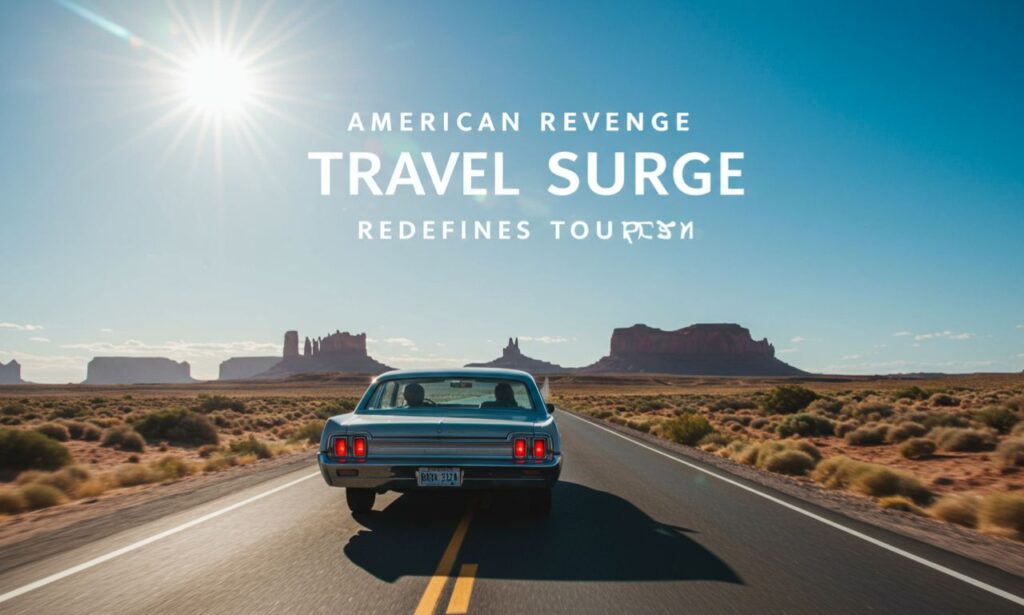The travel industry in the United States has witnessed a striking phenomenon known as the American revenge travel surge—a post-pandemic trend where people are traveling more, spending more, and going farther than ever before. After years of lockdowns, restrictions, and isolation, Americans are reclaiming their freedom with full-throttle vacations, bucket-list trips, and spontaneous weekend getaways.
This aggressive comeback isn’t just about wanderlust; it reflects deeper psychological, economic, and cultural shifts that are reshaping how Americans experience leisure and global mobility.
Understanding the Concept of Revenge Travel
The term “revenge travel” might sound dramatic, but it’s aptly named. It represents a form of emotional and experiential retaliation against the forced stillness of the COVID-19 pandemic. People are traveling not just for fun—but to make up for lost time, missed milestones, and delayed dreams.
Rather than small or budget trips, many Americans are going big: five-star hotels, luxury cruises, European escapades, or multi-country tours. This surge has injected new life into the struggling travel and tourism sectors.
Economic Indicators Behind the Surge
The numbers tell a compelling story:
-
Airfare Spending: Up by over 30% compared to pre-2020 levels
-
Hotel Occupancy: Surged to nearly 70% nationwide in summer 2024
-
International Departures: Reached record highs, especially to Europe and Asia
-
Cruise Bookings: Tripled in volume compared to early 2022
This boom isn’t limited to high-income travelers. Middle-class Americans are dipping into savings, using “buy now, pay later” services, or even cashing in PTO en masse to chase experiences they’ve deferred for years.
Psychological Drivers of the Trend
Revenge travel isn’t just economic—it’s emotional. Here’s why Americans are traveling with urgency:
-
Fear of Missing Out (FOMO): Lost years during the pandemic intensified people’s desire to live fully.
-
Health Reassessments: Many are motivated by the realization that health and time are not guaranteed.
-
Delayed Celebrations: Postponed honeymoons, graduations, and birthdays are being celebrated in grand style.
-
Freedom and Identity: Travel has become a symbolic reclaiming of freedom and a way to reconnect with one’s identity.
In short, the surge is driven by emotional catharsis and a deep craving for novelty.
Generational Trends in the Surge
Different age groups are expressing revenge travel in unique ways:
-
Gen Z: Opting for adventure travel, digital nomadism, and Instagram-worthy experiences.
-
Millennials: Prioritizing international destinations and immersive local experiences.
-
Gen X: Returning to travel with family-focused trips and multi-generational vacations.
-
Boomers: Spending on comfort, luxury, and bucket-list destinations.
Each generation has its motivations—but the common thread is a sense of urgency and emotional reclaiming.
Challenges Emerging from the Travel Boom
The revenge travel surge, while beneficial for tourism, has also created challenges:
-
Overcrowding: Airports, resorts, and landmarks are often overwhelmed.
-
Price Inflation: Demand has driven up the cost of flights, hotels, and rentals.
-
Labor Shortages: The hospitality industry still struggles to staff adequately.
-
Travel Fatigue: Some travelers report burnout from over-scheduling and high expectations.
As the surge continues, both businesses and consumers must find ways to balance excitement with sustainability.
The Role of Social Media and Influencer Culture
Platforms like Instagram, TikTok, and YouTube have amplified the travel trend. Influencers showcase dream vacations, curated itineraries, and travel hacks that inspire others to follow suit. Viral trends like #revengetravel or #takemeback fuel the collective momentum, especially among younger travelers.
Sustainable Travel in a Revenge Travel World
Despite the surge, there’s a growing awareness of sustainable practices. Many Americans are:
-
Choosing eco-conscious accommodations
-
Offsetting their carbon emissions
-
Visiting less-crowded destinations to reduce strain on local resources
Revenge travel, when practiced responsibly, can coexist with global sustainability goals.
Is the Revenge Travel Surge Here to Stay?
While some see revenge travel as a temporary burst, others believe it’s the beginning of a more experience-driven era. Analysts predict:
-
Continued high travel demand through 2026
-
Rise in hybrid travel models (work + leisure)
-
Increasing personalization through AI-powered travel platforms
Travel is no longer a luxury—it’s a priority, and Americans are making it a central part of their lifestyles.
Conclusion
The American revenge travel surge is more than just a tourism trend—it’s a reflection of a collective emotional shift and a redefinition of how Americans value time, freedom, and experiences. While it presents challenges, it also offers opportunities for personal growth, cultural exchange, and economic revival.







